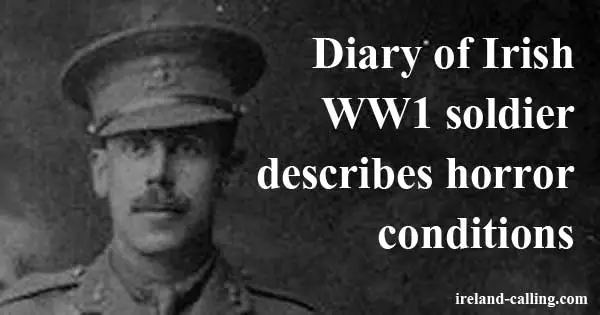The diaries of an Irish captain reveal the horror conditions for soldiers during the First World War.
Captain Noel Drury was born in Dublin. He was a soldier in the British Army and kept a diary throughout his time leading the 6th Dublin Fusiliers through the Balkans.

The diary is considered to be a vital resource for historians, offering a first-hand account of the day-to-day lives and activities of the soldiers.
The entries reveal that as well as fearing death at the hands of the enemy, the troops had equal concern that they would be killed by the extreme weather conditions they were forced to endure.
Dr Peter Johnston of the British National Army Museum said: “Drury’s diaries reveal the hardships soldiers went through due to the extremes of weather that are often forgotten as a major cause of death.
“The graphic descriptions of his and his troops’ experiences allow us to step back in time and imagine the everyday struggles of being a WWI soldier.”
On 27 November 1915 Drury wrote: “Very bad night – no shelter from the cold and wet. I had a rotten passage round the line, falling and stumbling about in snow drifts up to my shoulders in some places.
“The snow kept on falling yesterday evening and part of the night and then changed to a most intense frost. This morning everything is frozen hard and every track is too slippery to walk on. There are now about two feet of snow everywhere and much more in some places where drifts have formed.
“Our overcoats are frozen hard and when some of the men tried to beat theirs to make them pliable to lie down in they split like matchwood. The men can hardly hold their rifles as their hands freeze to the cold metal. Everyone is falling and tumbling about in the most ludicrous way.
“We had an enormous sick parade this morning nearly 150 men reporting. There are many bad cases of frostbite in hands and feet.”
As the cold weather relented and winter came to an end the soldiers were offered some respite from the freezing conditions.
However, an equally desperate period followed as the blistering heat of summer spread disease through the trenches and caused many men to pass out from heatstroke.
Drury’s entry on 30 June 1916 read: “The battalion paraded at 17.30 and the head of the column passed the starting point at 18.00.
“This is the best way to march, in the cool of the evening. [We] bivouacked for the night at 23.00. This was a scorching day and easily the hottest we have had yet but it was a little cooler when we paraded at 17.45.
“In theory the men rest and sleep till 16.00. Actually nobody could possibly sleep in a bivouvac or out of it in this heat with a black swarm of flies buzzing and crawling over everything. I think the flies are almost as bad as at Gallipoli and being younger are more active.”
Eventually Drury too succumbed to the conditions and was one of 480,000 disease casualties of the war sent home to recover.
He returned to the battlefield in 1917 and served out the rest of the war on the western front.
history.html
Diary of Irish WW1 soldier describes horror conditions
